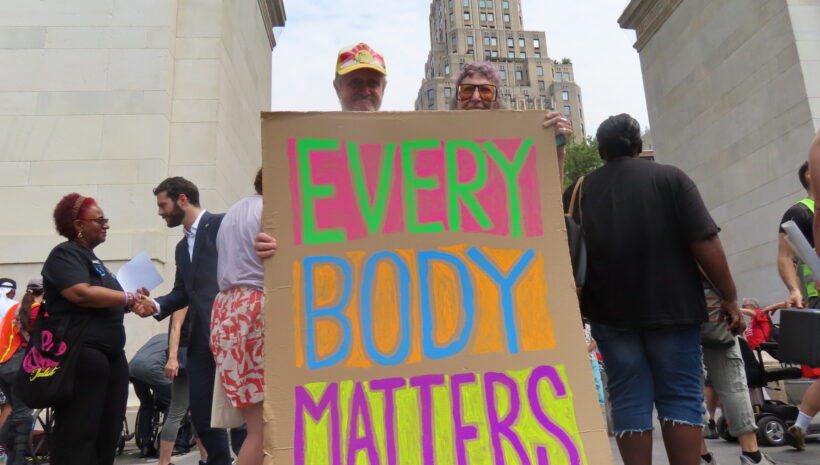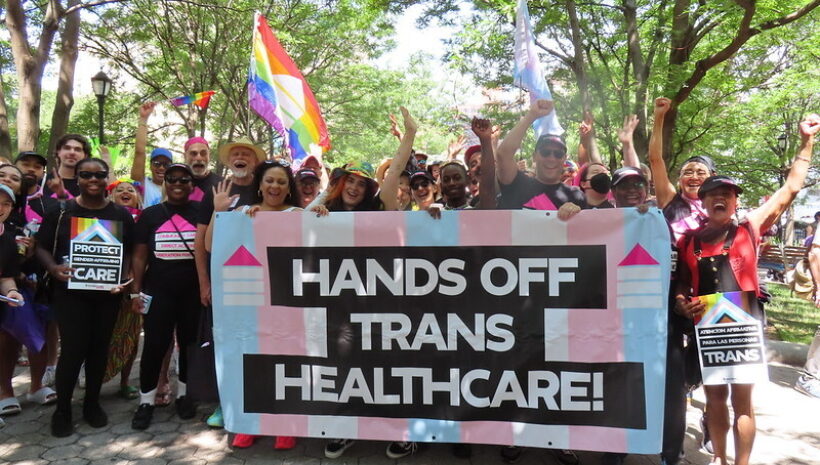Guest blogpost by Audu Kadiri, Activist and Housing Works Asylum Project Participant, & Scott S. Davis, Program Coordinator, Housing Works Asylum Project
On January 28, 2015, Nigerians in the New York LGBT Community organized an event to mark the one-year anniversary of the enactment of the “jail the gay” law in Nigeria. The event consisted of a documentary film screening and discussion hosted by GMHC and co-sponsored by Housing Works and Arcus Foundation, among other organizations, and about 90 people representing a number of organizations attended.
The event objectives were to:
1) facilitate conversation on the state of health and human rights service delivery to LGBT persons in Nigeria
2) create awareness of the effect of the law on migration to the U.S.; and
3) emphasize the need for media coverage on the current political situation in Nigeria as it affects sexual minorities.
Screening of the Doc Film Veil of Silence
After welcome remarks by GMHC CEO Kelsey Louie and UNDP Deputy Director, HIV, Health and Development, Bureau for Policy and Program Cliff Cortex, the attendees watched a screening of the documentary film Veil of Silence, directed by Habeeb Lawal. The film provided an insider view into the Nigerian LGBT community just prior to passage of the bill, and it highlighted its likely, dire consequences. Cortex noted that the anti-gay law also affects service delivery and said UNDP is working with the African Union, UN, and other organizations to replicate models that have proved successful in other parts of the world.
Habeeb Lawal, director of Veil of Silence, explained that the documentary was an insider advocacy view into the anti-gay Nigerian society. According to Habeeb, the documentary was shot in Lagos and Abuja in early 2013 and was screened at the film festival in London in September 2013—before the anti-gay law in Nigeria was passed in 2014. Those interviewed included LGBT activists, advocates, health workers, and those who share the struggle with the LGBT community in Nigeria. The same-sex marriage act (its approximate official title) is broad and ambiguous. This causes general misunderstanding of its implications on all Nigerian civil rights. The documentary aims to deconstruct the bill, break it down, and show how it affects every Nigerian.
Panel Discussion and Q&A on Nigerian LGBT Issues
The film screening was followed by a panel discussion that included funders, advocates for the LGBT community, and direct service providers to activists fleeing their country due to persecution:
- Michael Ighodaro, activist and asylee from Nigeria and former participant in Housing Works’ Asylum Project;
- Marie De Cenival, Global Health and Gender Program Analyst at Heartland Alliance International;
- Thierry A. Ekom, HIV Prevention Specialist at NYC Department of Health;
- Scott S. Davis, Program Coordinator of The Asylum Project at Housing Works;
- Pamela Denzer, Asylum Program Supervisor at Immigration Equality;
- Marianne Mollmann, Program Director at International Gay and Lesbian Human Rights Commission.

Panelists from left to right: Micheal Ighodaro, activist and asylee from Nigeria and former participant in Housing Works’ Asylum Project; Marie De Cenival, Global Health and Gender Program Analyst at Heartland Alliance International; Thierry A. Ekom, HIV Prevention Specialist at NYC Department of Health; Scott S. Davis, Program Coordinator, The Asylum Project at Housing Works; Pamela Denzer, Asylum Program Supervisor at Immigration Equality; and Marianne Mollmann, Program Director at International Gay and Lesbian Human Rights Commission
Panelists were given five minutes apiece to present the work of their respective organizations.
Michael Ighodaro talked about how he returned to the U.S. after the international AIDS 2012 conference in Washington, DC. He had to flee Nigeria after being attacked by men who identified him from an interview he granted while attending the conference in DC. He also talked about his work in Nigeria as an activist in an LGBT organization in Abuja and outlined the challenges of providing services to the LGBT community in Nigeria. Now that the law has been passed, it’s illegal to provide HIV education and services to the LGBT community in Nigeria. His LGBT organization in Nigeria had over 1,000 gay, male clients on ARV medication who were accessing services from the organization. A recent survey indicated that because of the new law, 90% of his clients stopped accessing services.
Ighodaro mentioned that a group of lawyers from UK and Nigeria had taken the case to court. A ruling is expected after the upcoming national elections this month. This election period is an opportunity to push for LGBT rights now that the politicians are campaigning for votes. Currently two coalitions in Nigeria are coordinating the activities of LGBT organizations and activists. Ighodaro asked for the support of everyone and every organization present to assist the cause of these coalitions back in Nigeria.
Marie De Cenival spoke about the work of Heartland Alliance International, headquartered in Chicago with additional offices also in New York. Heartland focuses on the empowerment of the most marginalized people and advocating for their right to health and justice. De Cenival spoke about Heartland’s efforts in Nigeria since 2009, supporting five LGBT-focused organizations, building their capacities to be strong advocates for themselves, and implementing programs and supporting them to build their own networks advocating for health provision.
According to De Cenival, client security and safety have been and continue to be a major concern. For example, strategies were adopted by the programs Heartland supports to change their names in order to protect their clients. In addition, terms such as MSM (men who have sex with men) and Most At Risk were no longer used. Even Heartland modified its name to avoid the use of the phrases “human needs” and “human rights.”
Other steps taken after the bill was passed included safety plan training, human rights education for clients and organizations, production and distribution of “Know Your Rights” flyers, and providing numbers to call when arrested or in trouble.
Thierry A. Ekom of the NYC Department of Health noted that about 128,000 Africans are in New York City currently. He spoke about the evolution of HIV in New York City, how people were dying in the early days and the successes that have been achieved in reducing the rate of HIV deaths in NYC. He presented data showing Africans have the highest rate of HIV in NYC. Observing that HIV is associated with God’s punishment, stigma, and homosexuality among Africans, Ekom asserted that only further discussion about education with gay, African men will improve this situation.
Scott S. Davis gave a brief background on the Housing Works Asylum Project and how it has helped LGBT asylum seekers in New York City. He said the Asylum Project was designed to support LGBT activists who are fleeing their countries because of who they are and what they do. The Project began with two participants from Nigeria in late 2012 and has now served 32 individuals. Program participants are provided housing, asylum counsel, healthcare, job training, a subsistence stipend, and once work authorization is granted, assistance finding a job.
The goal of the Asylum Project is to help participants get asylum in the U.S. and start a new life. The project currently serves people from 10 countries—Nigeria, Ghana, Mexico, Uganda, Liberia, Kosovo, Russia, Tunisia, Jamaica and Kenya. Thus far, 14 participants have been granted asylum or resident status, 11 have filed applications and are waiting, and another four will file shortly. All are expected to participate in the advocacy missions that Housing Works organizes or supports.
The Asylum Project currently houses 14 people, with another six on a waiting list. Most of the participants, if they have not yet become employed, are volunteering over 800 hours a month. Davis asserted that Housing Works would continue to support those in the Project and especially work to find housing for those on the waiting list.
Pamela Denzer revealed that Immigration Equality (IE) is the only national LGBT organization in the United States helping people secure asylum in the U.S. and noted that the organization had won 700 cases. According to Denzer, it costs about $17 million annually to help people obtain asylum here. Denzer also explained what it meant to seek asylum in the U.S. as well as the necessary qualifications to do so. She also shed more light on what the asylum process in the U.S. entails, including the fact that a person seeking asylum cannot return to his/her original country of persecution until after obtaining U.S. citizenship. One year following the granting of asylum, an individual is qualified to apply for a green card (permanent resident) and five years later, that person can apply for citizenship.
The number of Nigerians contacting Immigration Equality for help has gone up dramatically over the past three years, increasing nearly 800% during that time period. In 2011, 16 individuals from Nigeria contacted IE; in 2012, the number more than double to 36 individuals; the total more than doubled again to 78 people in 2013; and in 2014, the number rose to 125, an increase of over 60% from the previous year. Denzer attributed the most recent increase to the passage of the law criminalizing same-sex marriage.
Marianne Mollmann of the International Gay and Lesbian Human Rights Commission spoke last and said that we should be moving towards a broader conversation. She noted that Nigeria is not the only country where these laws exist and that her organization had receiving calls from other countries.
Mollmann went on to talk about the root causes of the ignorance, bias, prejudice, and discrimination portrayed in the documentary film—as well as the way in which religion is hijacked and used as a weapon to promote these misperceptions—and she argued that these viewpoints tended to be based on three myths about sexual orientation and gender identity:
1. that being LGBT is a new phenomenon saying people should claim their identity;
2. that being LGBT is about sex and gender identity, leading to bathroom panics because being LGBT is all about sex and genitals;
3. and that being LGBT is one thing and sexual orientation and gender identity is another thing entirely.
She went on to argue that heterosexual people also have sexual identity. She concluded by saying access to health, education, and employment are much more important issues that organizations and governments should be addressing instead of those concerning sexual orientation.
The panel was followed by a question-and-answer period that included clarification about conditions in the northern and southern parts of Nigeria and that because of sharia laws in the north, conditions are harsher. One question focused on whether the support of church organizations has been sought. Mollmann explained there are efforts to engage religious groups in actively addressing these issues, such as the UN Office of the Unitarian Universalist Association, to cite one church-related example.
What You Can Do to Help
- Share this post on Twitter and Facebook.
- Learn more about the Housing Works Asylum Project.
- Join the Housing Works advocacy community! For more information on how to get involved, contact Jaron Benjamin, VP of Community Mobilization & National Advocacy, at j.benjamin@housingworks.org. To learn more about our advocacy efforts, go to www.housingworks.org/advocate.
- Support our global advocacy work on behalf of people of color, LGBT people, and other marginalized communities and donate to Housing Works today!
- To learn more about our advocacy efforts, sign up for our weekly AIDS Issues Update blog and check out www.housingworks.org/advocate.
![]() Get AIDS Issues Update blogposts via email
Get AIDS Issues Update blogposts via email
![]() Like Housing Works on Facebook
Like Housing Works on Facebook
![]() Follow Housing Works on Twitter, @housingworks
Follow Housing Works on Twitter, @housingworks




